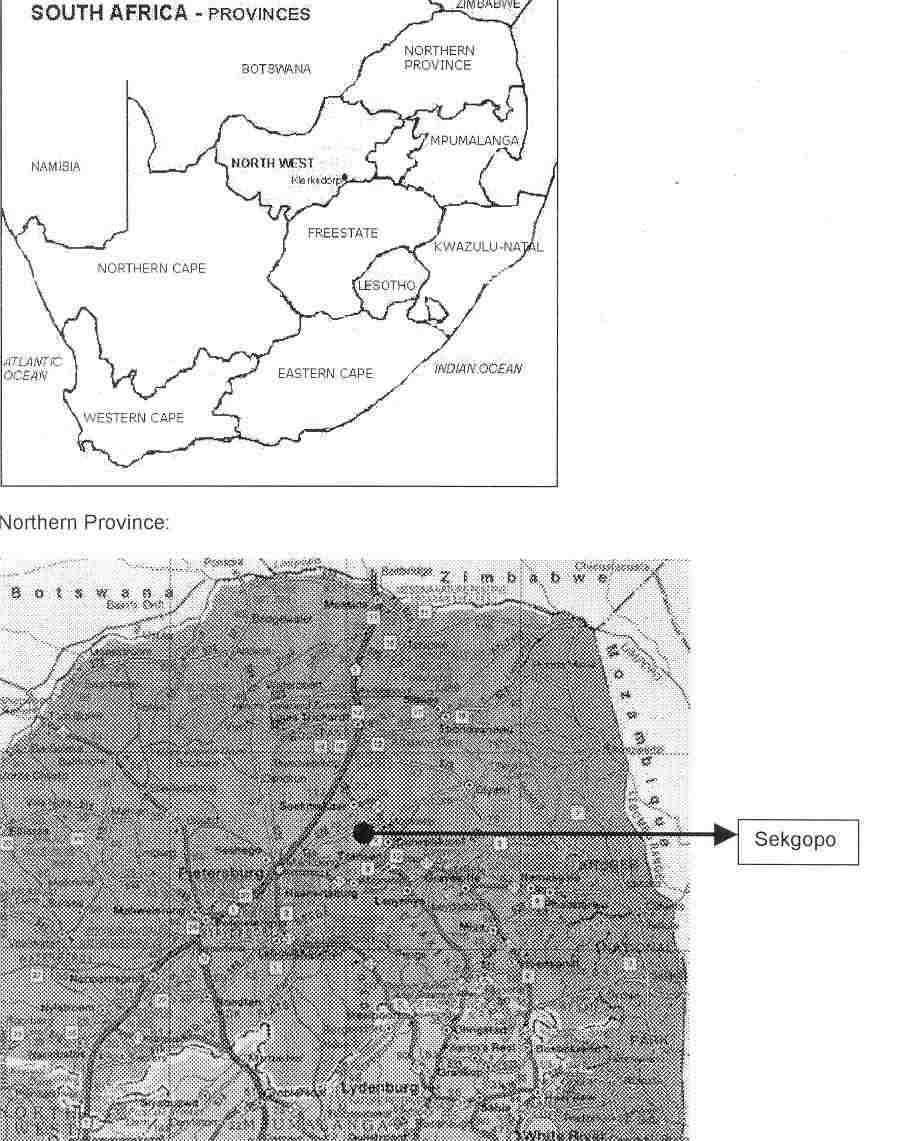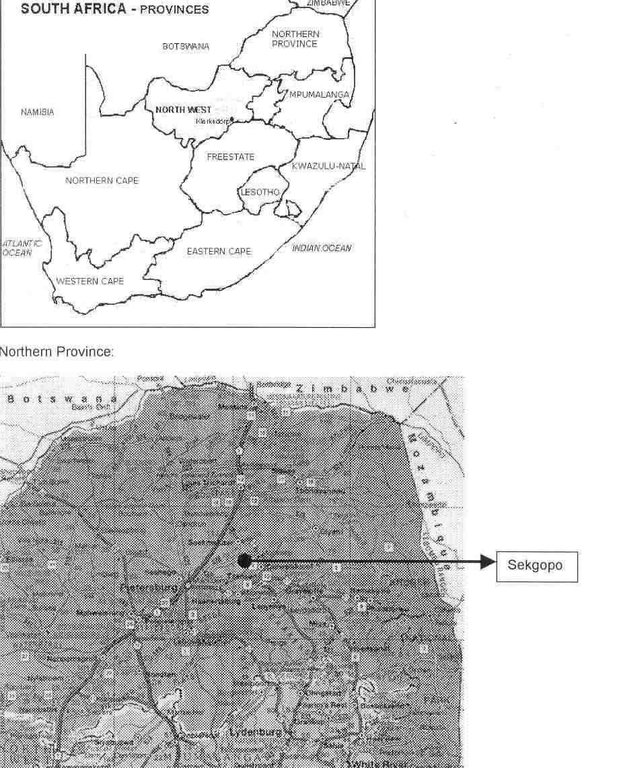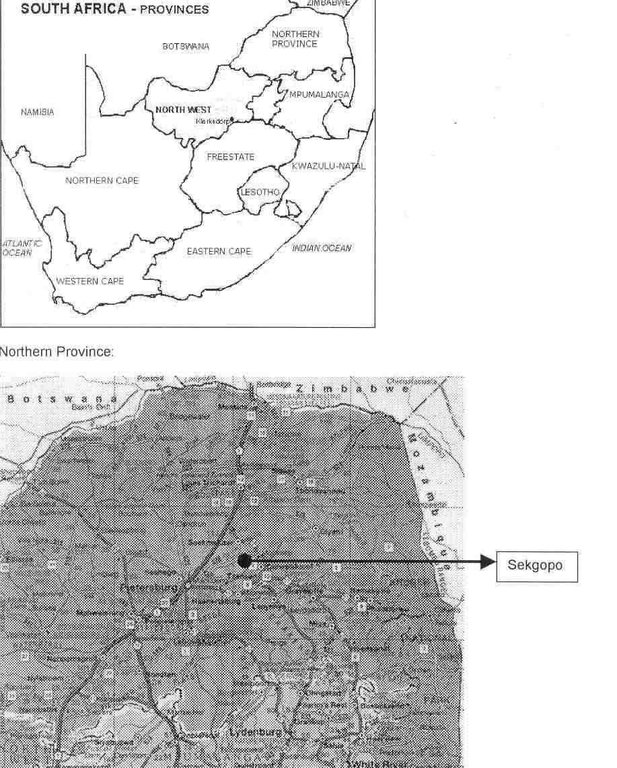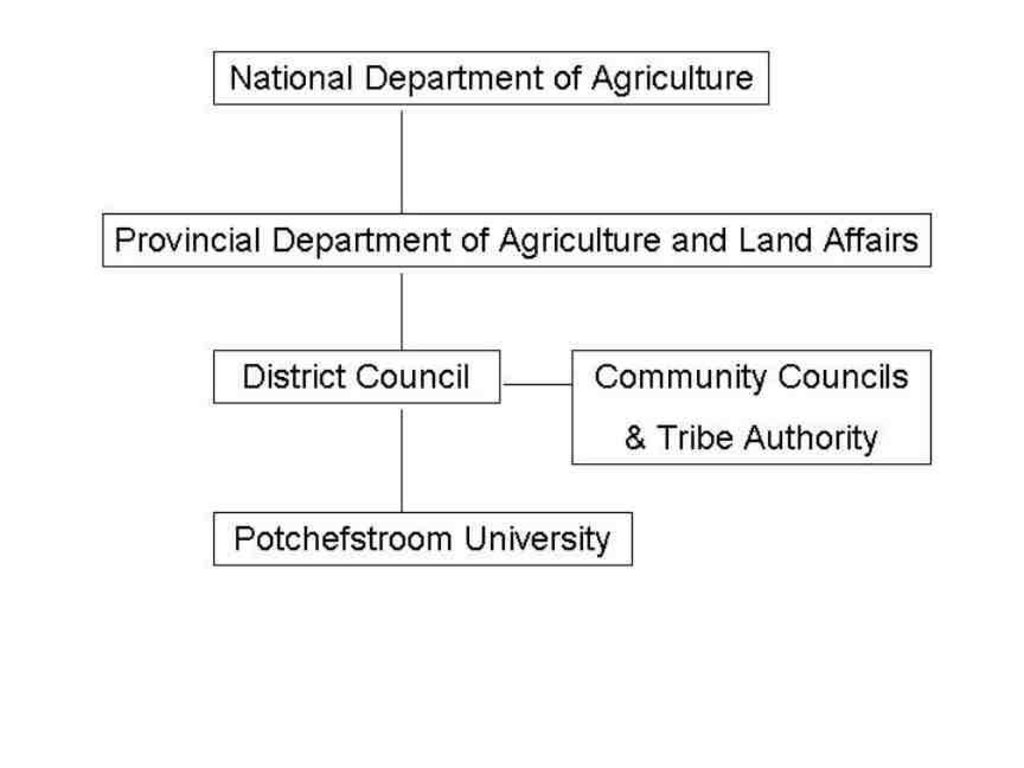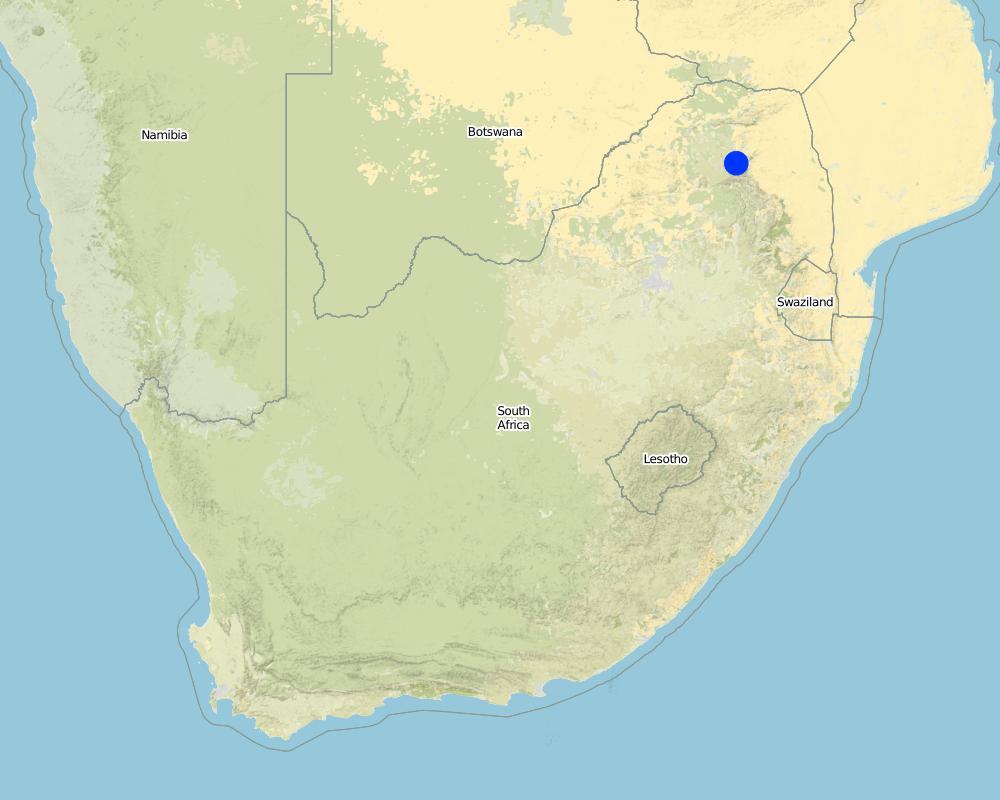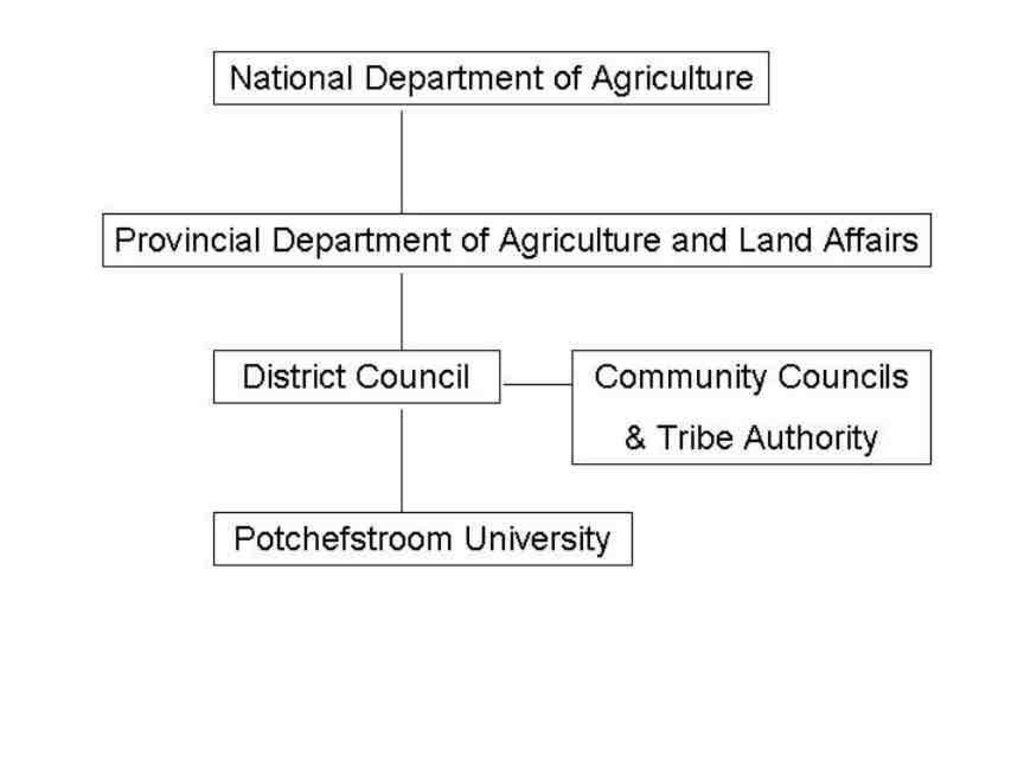Government funded demonstrations [แอฟริกาใต้]
- ผู้สร้างสรรค์:
- การอัพเดท:
- ผู้รวบรวม: Klaus Kellner
- ผู้เรียบเรียง: –
- ผู้ตรวจสอบ: Fabian Ottiger
approaches_2341 - แอฟริกาใต้
ดูส่วนย่อย
ขยายทั้งหมด ย่อทั้งหมด1. ข้อมูลทั่วไป
1.2 รายละเอียดที่ติดต่อได้ของผู้รวบรวมและองค์กรที่เกี่ยวข้องในการประเมินและการจัดเตรียมทำเอกสารของแนวทาง
ผู้เชี่ยวชาญ SLM:
Barac Anushka
Potchefstroom University for Christian Higher Education
แอฟริกาใต้
ผู้เชี่ยวชาญ SLM:
Van den Berg Loraine
Potchefstroom University for Christian Higher Education
แอฟริกาใต้
ผู้เชี่ยวชาญ SLM:
J van Rensburg Anja
Potchefstroom University for Christian Higher Education
แอฟริกาใต้
ผู้เชี่ยวชาญ SLM:
ผู้เชี่ยวชาญ SLM:
Van der Walt Izak
Provincial Soil Conservation Department in Northern Province
แอฟริกาใต้
ผู้เชี่ยวชาญ SLM:
Monque Augustine
Provincial Soil Conservation Department in Northern Province
แอฟริกาใต้
ชื่อของโครงการซึ่งอำนวยความสะดวกในการทำเอกสารหรือการประเมินแนวทาง (ถ้าเกี่ยวข้อง)
Potchefstroom Universiteit vir CHO (Potchefstroom Universiteit vir CHO) - แอฟริกาใต้ชื่อของโครงการซึ่งอำนวยความสะดวกในการทำเอกสารหรือการประเมินแนวทาง (ถ้าเกี่ยวข้อง)
Department of Agriculture of Zambia (Department of Agriculture) - แซมเบียชื่อของโครงการซึ่งอำนวยความสะดวกในการทำเอกสารหรือการประเมินแนวทาง (ถ้าเกี่ยวข้อง)
Dept. of Agriculture, Northern Province (Dept. of Agriculture, Northern Province) - แอฟริกาใต้1.3 เงื่อนไขที่เกี่ยวข้องกับการใช้ข้อมูลที่ได้บันทึกไว้ผ่านทาง WOCAT
ผู้รวบรวมและวิทยากรหลักยอมรับเงื่อนไขเกี่ยวกับการใช้ข้อมูลที่ถูกบันทึกผ่านทาง WOCAT:
ใช่
1.4 การอ้างอิงถึงแบบสอบถามเรื่องเทคโนโลยี SLM
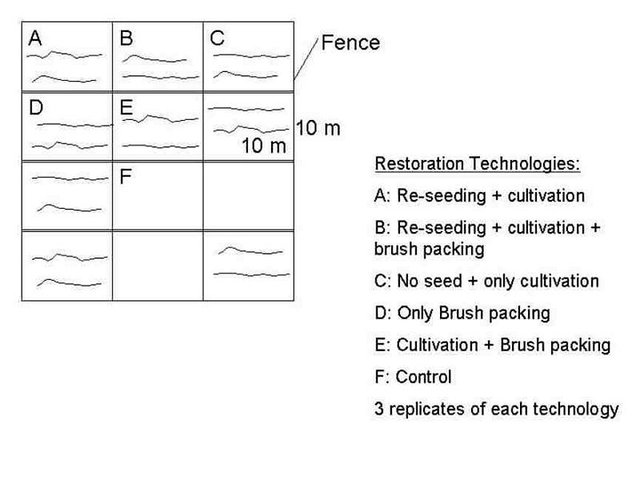
Revegetation and re-seeding [แอฟริกาใต้]
Revegetation of old, degraded land. Restoring area to increase grazing capacity and production.
- ผู้รวบรวม: Klaus Kellner
2. คำอธิบายของแนวทาง SLM
2.1 การอธิบายแบบสั้น ๆ ของแนวทาง
Government funded restoration demonstration site to restore degraded land - by community participation. Community becoming the key sake holders - Capacity building.
2.2 การอธิบายอย่างละเอียดของแนวทาง
การอธิบายอย่างละเอียดของแนวทาง:
Aims / objectives: Awareness raising and community participation. Capacity building, to teach the aim and type of technologies to the communities with the help of extension workers, scientists and academic staff, including postgraduate students. The main aim is to improve the condition of the land for high grazing capacity and production potential.
2.3 รูปภาพของแนวทาง
2.5 ประเทศ ภูมิภาค หรือสถานที่ตั้งที่ได้นำแนวทางไปใช้
ประเทศ:
แอฟริกาใต้
ภูมิภาค/รัฐ/จังหวัด: :
North West Province
Map
×2.6 วันที่เริ่มต้นและสิ้นสุดของแนวทาง
การสิ้นสุดลง (ถ้าแนวทางไม่ได้ใช้อีกต่อไป):
2002
2.7 ประเภทของแนวทาง
- ใช้โครงงานหรือแผนงานเป็นฐาน
2.8 เป้าหมายหรือวัตถุประสงค์หลักของแนวทาง
The Approach focused mainly on SLM with other activities (Capacity building of SWC technicians and community members.)
Awareness and participation. Training of technologies for restoration. On site or 'On-Farm' technology application.
The SLM Approach addressed the following problems: Restoring degraded land (old lands) by cultivation and oversowing technologies.
2.9 เงื่อนไขที่เอื้ออำนวยหรือเป็นอุปสรรคต่อการนำเทคโนโลยีภายใต้แนวทางนี้ไปปฏิบัติใช้
การมีไว้ให้หรือการเข้าถึงแหล่งการเงินและบริการ
- เป็นอุปสรรค
No money for restoration. Negative cost/benefit ration in short term.
Treatment through the SLM Approach: Apply more cost effective technologies
กรอบแนวทางในการดำเนินการด้านกฎหมาย (การถือครองที่ดิน สิทธิในการใช้ที่ดินและน้ำ)
- เอื้ออำนวย
The existing land ownership, land use rights / water rights helped a little the approach implementation: Help: land users again appreciated the role and importance of the natural resources. Hinder: lack of land tenure and ownership.
ความรู้เกี่ยวกับ SLM การเข้าถึงการสนับสนุนด้านเทคนิค
- เป็นอุปสรรค
No awareness and skills
Treatment through the SLM Approach: Capacity building and job creation. Commitment by stake holders and rural communities assured.
3. การมีส่วนร่วมและบทบาทของผู้มีส่วนได้ส่วนเสียที่เกี่ยวข้อง
3.1 ผู้มีส่วนได้ส่วนเสียที่เกี่ยวข้องในแนวทางนี้และบทบาท
- ผู้ใช้ที่ดินระดับท้องถิ่นหรือชุมชนระดับท้องถิ่น
Specific ethnic groups: Sotho's
Work done and technology carried out by community. Mostly women as they need to earn money for food and household. Community councils; tribal authority - Chiefs make decisions.
- องค์กรพัฒนาเอกชน
University helped with implementation of technology
- รัฐบาลแห่งชาติ (ผู้วางแผน ผู้ทำการตัดสินใจ)
Funded mainly by NDA
- องค์การระหว่างประเทศ
Funds
ถ้ามีผู้มีส่วนได้ส่วนเสียหลายคนที่เกี่ยวข้องให้ระบุหน่วยงานตัวแทน:
National specialists improved and designed technologies and land users gave inputs with regard to type of area, plants and usage of grazing land.
3.2 การเกี่ยวข้องของผู้ใช้ที่ดินระดับท้องถิ่นหรือชุมชนระดับท้องถิ่นในช่วงต่างๆของแนวทาง
| ความเกี่ยวข้องของผู้ใช้ที่ดินระดับท้องถิ่นหรือชุมชนระดับท้องถิ่น | ระบุผู้ที่มีส่วนเกี่ยวข้องและอธิบายกิจกรรม | |
|---|---|---|
| การริเริ่มหรือการจูงใจ | ไม่ลงมือ | Mainly:public meetings; partly: workshops/seminars |
| การวางแผน | ไม่ลงมือ | Mainly: workshops/seminars; partly: public meetings |
| การดำเนินการ | จ่ายเงินหรือสนับสนุนจากภายนอก | Mainly: responsibility for major steps; partly: casual labour |
| การติดตามตรวจสอบหรือการประเมินผล | ปฏิสัมพันธ์ | |
| Research | ปฏิสัมพันธ์ | on-farm |
3.3 แผนผังแสดงขั้นตอนการทำงาน (ถ้ามี)
3.4 การตัดสินใจเลือกใช้เทคโนโลยี SLM
ระบุผู้ที่ทำการตัดสินใจเลือกเทคโนโลยีมากกว่าหนึ่งวิธีไปปฏิบัติใช้:
- ผู้เชี่ยวชาญ SLM เป็นผู้ตัดสินใจหลัก ที่ติดตามให้คำปรึกษากับผู้ใช้ที่ดิน
การอธิบาย:
consultative.
Decisions on the method of implementing the SLM Technology were made by mainly by SLM specialists with consultation of land users. consultative.
4. การสนับสนุนด้านเทคนิค การสร้างขีดความสามารถ และการจัดการด้านความรู้
4.1 การสร้างขีดความสามารถ / การอบรม
ได้มีการจัดอบรมให้แก่ผู้ใช้ที่ดินหรือผู้มีส่วนได้ส่วนเสียคนอื่น ๆ หรือไม่:
ใช่
รูปแบบการอบรม:
- เกษตรกรกับเกษตรกร
- ใช้พื้นที่ทำการสาธิต
- จัดการประชุมสู่สาธารณชน
หัวข้อที่พูด:
Ecological principles; Restoration technologies; NRM principles.
4.2 การบริการให้คำแนะนำ
ผู้ใช้ที่ดินมีการเข้าถึงการรับบริการให้คำปรึกษาหรือไม่:
ใช่
ระบุว่ามีบริการให้คำปรึกษาหรือไม่:
- ไปเยี่ยมชมสถานที่
การอธิบาย/แสดงความคิดเห็น:
Name of method used for advisory service: Demonstration/Participation; Key elements: 'Learning by Doing'; 1) Mainly: government's existing extension system, Partly: non-governmental agency.
Advisory service is inadequate to ensure the continuation of land conservation activities; Monitoring, data analysis and presenting of results will be conducted by Research staff and project implementation. Expert advice needed on a continuous basis.
4.3 การเสริมความแข็งแกร่งให้กับสถาบัน (การพัฒนาองค์กร)
สถาบันได้รับการจัดตั้งขึ้นมาหรือเสริมความแข็งแกร่งโดยแนวทางนี้หรือไม่:
- ใช่ เล็กน้อย
ระบุระดับของสถาบันที่ได้รับการเสริมความแข็งแกร่งหรือจัดตั้งขึ้นมา:
- ท้องถิ่น
ระบุประเภทของการให้ความช่วยเหลือสนับสนุน:
- การสร้างขีดความสามารถ / การอบรม
4.4 การติดตามตรวจสอบและประเมินผล
การติดตามตรวจสอบและประเมินผลเป็นส่วนหนึ่งของแนวทางหรือไม่:
ใช่
ความคิดเห็น:
bio-physical aspects were regular monitored through measurements
technical aspects were ad hoc monitored through observations
socio-cultural aspects were ad hoc monitored through observations
economic / production aspects were ad hoc monitored through observations
area treated aspects were regular monitored through measurements
no. of land users involved aspects were regular monitored through measurements
management of Approach aspects were regular monitored through measurements
There were no changes in the Approach as a result of monitoring and evaluation: This was one site establishment for demonstration purposes of technologies.
4.5 การวิจัย
การวิจัยเป็นส่วนหนึ่งของแนวทางหรือไม่:
ใช่
ระบุหัวข้อเรื่อง:
- นิเวศวิทยา
- เทคโนโลยี
ให้ข้อมูลเพิ่มเติมและให้ระบุผู้ทำการวิจัย:
Vegetation and soil monitoring/analysis. Application of restoration technologies in demonstration plots.
Research was carried out on-farm
5. การสนับสนุนด้านการเงินและวัสดุอุปกรณ์
5.1 ระบุงบประมาณประจำปีสำหรับแนวทาง SLM นี้
ถ้าหากว่างบประมาณประจำปีไม่เป็นที่ทราบแน่นอน ให้ระบุช่วงลงไป:
- < 2,000
แสดงความคิดเห็น (แหล่งของการระดมทุน ผู้บริจาคคนสำคัญ):
Approach costs were met by the following donors: government (national - Agriculture): 80.0%; national non-government (University): 20.0%
5.2 การสนับสนุนด้านการเงิน / วัสดุอุปกรณ์ให้แก่ผู้ใช้ที่ดิน
ผู้ใช้ที่ดินได้รับการสนับสนุนด้านการเงิน / วัสดุอุปกรณ์ไปปฏิบัติใช้เทคโนโลยีหรือไม่:
ใช่
5.3 เงินสนับสนุนสำหรับปัจจัยนำเข้า (รวมถึงแรงงาน)
- อุปกรณ์
| ระบุปัจจัยนำเข้าที่ได้รับการสนับสนุน | เห็นด้วยระดับไหน | ระบุเงินสนับสนุน |
|---|---|---|
| เครื่องจักร | ได้รับการช่วยเหลือทางการเงินบางส่วน | |
- การเกษตร
| ระบุปัจจัยนำเข้าที่ได้รับการสนับสนุน | เห็นด้วยระดับไหน | ระบุเงินสนับสนุน |
|---|---|---|
| เมล็ด | ได้รับการช่วยเหลือทางการเงินแบบเต็ม | |
| ปุ๋ย | ได้รับการช่วยเหลือทางการเงินแบบเต็ม | |
- วัสดุสำหรับการก่อสร้าง
| ระบุปัจจัยนำเข้าที่ได้รับการสนับสนุน | เห็นด้วยระดับไหน | ระบุเงินสนับสนุน |
|---|---|---|
| Fence | ได้รับการช่วยเหลือทางการเงินแบบเต็ม | |
ถ้าแรงงานโดยผู้ใช้ที่ดินเป็นปัจจัยนำเข้าที่มีอยู่มากมาย ระบุด้วยว่าเนื่องจาก:
- จ่ายเป็นเงินสด
ความคิดเห็น:
Job-creation incentives
5.4 เครดิต
มีการจัดหาเครดิตมาให้ภายใต้แนวทาง SLM หรือไม่:
ไม่ใช่
6. การวิเคราะห์ผลกระทบและการสรุป
6.1 ผลกระทบของแนวทาง
ช่วยให้ผู้ใช้ที่ดินนำเอาเทคโนโลยี SLMไปใช้และบำรุงรักษาสภาพไว้ได้หรือไม่:
- ไม่ใช่
- ใช่ เล็กน้อย
- ใช่ ปานกลาง
- ใช่ อย่างมาก
Oversowing and better soil seed bank; good cultivation methods; certain adapted grass species used.
Land users do not own the land - any SWC application can be of more value and land users will be more committed if they take ownership.
Did other land users / projects adopt the Approach?
- ไม่ใช่
- ใช่ เล็กน้อย
- ใช่ ปานกลาง
- ใช่ อย่างมาก
Approach will be extended to other rural areas.
6.3 ความยั่งยืนของกิจกรรมของแนวทาง
ผู้ใช้ที่ดินสามารถทำให้สิ่งต่างๆ ที่ได้ปฏิบัติใช้โดยแนวทางนี้ยั่งยืนได้หรือไม่ (โดยไม่มีการสนับสนุนจากภายนอก):
- ใช่
ถ้าตอบว่าใช่ ให้อธิบายว่าอย่างไร :
Extension workers have learned the SWC technology from specialists (University researcher) and he/she together with the land user will hopefully extend the technology to larger and other areas on that own. Specialist must however make results available o
6.4 จุดแข็งและข้อได้เปรียบของแนวทาง
| จุดแข็ง / ข้อได้เปรียบของแนวทางในทัศนคติของผู้ใช้ที่ดิน |
|---|
| Learned a lot - especially with regard to the restoration process |
| Earned money - job-creation |
| Knowledge about sustainable rangeland management strategies improved |
| School children and teachers involved. School projects on SWC technologies and restoration ecology in particular |
| จุดแข็ง / ข้อได้เปรียบของแนวทางในทัศนคติของผู้รวบรวมหรือวิทยากรหลัก |
|---|
| Co-operation between all stakeholders (How to sustain/ enhance this strength: By making data and analysis scientifically sound - results better) |
| Land users, technicians/extension, researcher, policy makers |
| SWC technology will be monitored by scientists - value added to project |
6.5 จุดอ่อน / ข้อเสียเปรียบของแนวทางและวิธีในการแก้ไข
| จุดอ่อน / ข้อเสียเปรียบในทัศนคติของผู้ใช้ที่ดิน | สามารถแก้ไขปัญหาได้อย่างไร |
|---|---|
| Often too long before action is taken | Faster action. Extension better and more committed |
| Linguistic abilities. Land user has another language (Sotho), not spoken by specialist | Take local language classes and learn local language |
| SWC technology application must not only be build on job-creation incentives, but must be sustainable in the long term and applied by land user without payment. |
| จุดอ่อน / ข้อเสียเปรียบในทัศนคติของผู้รวบรวมหรือวิทยากรหลัก | สามารถแก้ไขปัญหาได้อย่างไร |
|---|---|
| Often too long before action is taken | Faster action. Extension better and more committed |
| Linguistic abilities. Land user has another language (Sotho), not spoken by specialist | Take local language classes and learn local language |
| SWC technology application must not only be build on job-creation incentives, but must be sustainable in the long term and applied by land user without payment. |
7. การอ้างอิงและการเชื่อมต่อ
7.1 วิธีการหรือแหล่งข้อมูล
- ไปเยี่ยมชมภาคสนาม การสำรวจพื้นที่ภาคสนาม
- การสัมภาษณ์กับผู้ใช้ที่ดิน
ลิงก์และโมดูล
ขยายทั้งหมด ย่อทั้งหมดลิงก์

Revegetation and re-seeding [แอฟริกาใต้]
Revegetation of old, degraded land. Restoring area to increase grazing capacity and production.
- ผู้รวบรวม: Klaus Kellner
โมดูล
ไม่มีโมดูล


